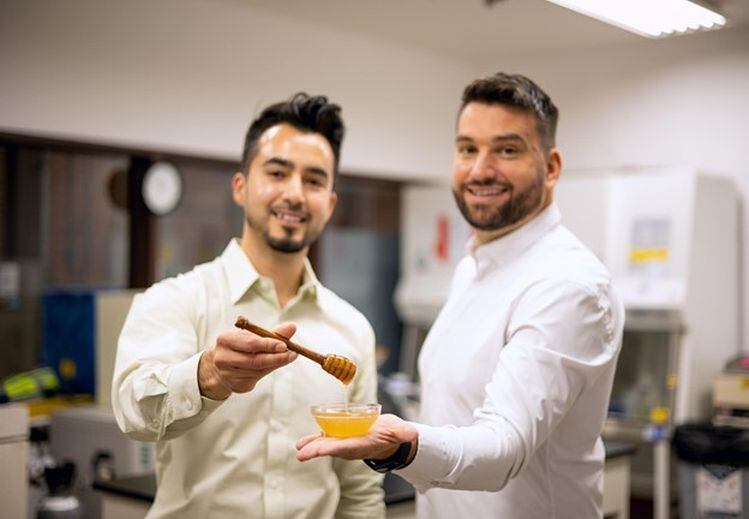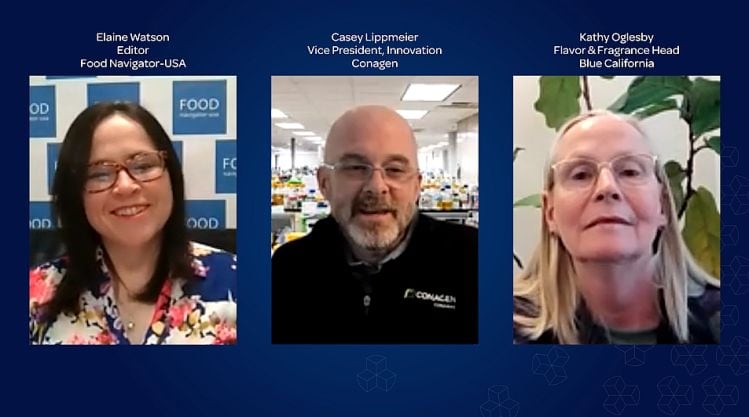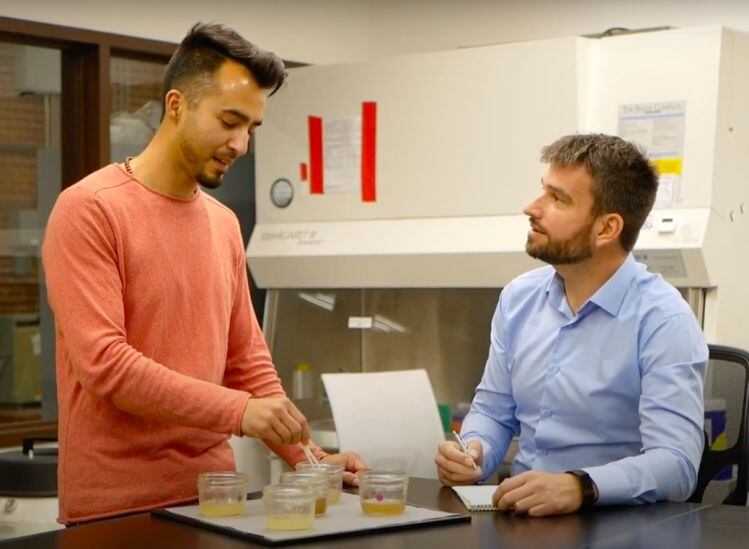MeliBio – which is in talks with potential partners from several countries and expects further commercial product rollout in the first half of 2022 - has raised funds from Big Idea Ventures, Joyance Partners, 18.ventures, Sparklabs Cultiv8, Sustainable Food Ventures, Capital V, angel investor Courtney Reum and two mission-driven family offices from GlassWall Syndicate.
So how is it making its honey… and can you call it ‘honey’ on a food label?
MeliBio recently filed a provisional patent around its technology, but is not (yet) going into details about its proprietary process. However, it says production involves "plant science, synthetic biology, and precision fermentation," technologies now deployed by a growing number of companies to produce everything from whey protein to enzymes and vitamins, observed CEO Darko Mandich, a Serbian entrepreneur and honey-enthusiast who teamed up with molecular biologist Dr Aaron Schaller to create MeliBio early last year.
He won't go into details at this stage, but said MeliBio is effectively biosynthesizing honey by replicating the multistep process that honey bees use to convert nectar (a sugary liquid produced by flowering plants) into food (digestion, regurgitation, enzyme activity, and evaporation).
The honey he and Dr Schaller are producing contains all the key components of the real thing (which contains a complex mix of sugars, and small amounts of proteins, minerals, amino acids, enzymes, and micronutrients), including components of nutritional interest as well as sugars, he claimed.
“Not only that, we are delivering the amazing taste and texture of honey, but also the micronutrients that make it amazing."
Labeling and regulatory questions
Mandich and Schaller are talking to legal experts about regulatory matters, but do not anticipate major challenges given that all of the components they are producing are identical to those in honey, which has been safely consumed for thousands of years.
“Our first product is fully plant-based, coming from ingredients that are already GRAS," said Mandich. "We’re not introducing anything novel or unfamiliar to the market.”
As for labeling, there is no US federal standard of identity for honey, although the FDA says in guidance issued in 2018 that “reference materials in the public domain define honey as ‘a thick, sweet, syrupy substance that bees make as food from the nectar of plants or secretions of living parts of plants and store in honeycombs.’ FDA has concluded that this definition accurately reflects the common usage of the term ‘honey’."
According to Mandich: "We proudly say that our product is honey, but not produced by the bees," said Mandich. "Our labelling approach will provide a clear description on how our product was produced and came to the market."
'We proudly say that our product is honey, but not produced by the bees'
The fact that animal products made without animals are already on the market is helping pave the way for companies such as MeliBio, he added. For example, Perfect Day’s milk proteins made using a genetically engineered microbe are listed on ingredients statements as ‘non-animal whey protein.'
MeliBio hasn't revealed the micro-organisms it is working with. However, a group of students from the Technion – Israel Institute of Technology - won an award in 2019 for their work on a bee-free honey using the bacterium Bacillus subtilis.
"We are not at liberty to disclose our proprietary technology at this time," said Mandich, "though MeliBio has been aware of the Technion team's project using the B. subtilis system since it was made public. We commend them for this impressive work."
“MeliBio has the real potential to change not just the honey category but the whole sweetener and skincare industries with a new and sustainable way to create real honey without the bees. MeliBio has created the first truly vegan honey.”
Andrew D. Ive, founder and general managing partner, Big Idea Ventures
“MeliBio’s honey is indistinguishable from traditional bee-made honey, and its properties enable food and cosmetic processors to cost-effectively and scalably introduce a variety of complex sugars into consumer products, with potentially broader appeal. Demand for honey is increasing, and, as we understand it, there is no ecologically sustainable way to meet this growing demand.”
Nik Talreja, Partner at 18.ventures
The business case for vegan honey
But why make honey without bees in the first place?
While the ethical and environmental rationale behind seeking alternatives to industrial-scale egg and dairy production is perhaps easier to understand, there are also compelling arguments for seeking alternatives to commercial-scale honey production, claimed Mandich.
The first argument is about simple economics, he said. US honey consumption, he points out, is showing significant growth, primarily from honey's use as a sweetener in packaged food products from snacks to beverages, while the global honey market is projected to reach $14bn by 2025, up from 8.4bn in 2018.
But at the same time, honey is getting steadily more expensive, while honey bee populations are declining due to viruses, parasites, bacterial and fungal pathogens, and climate change. So, there’s a clear opportunity to step in with an accessible and affordable product that can be biosynthesized.
Commercial honey production
The second argument – which MeliBio lays out in more detail in a report on bees – spans ethics, biodiversity, and sustainability, and notes that while there are 20,000 bee species that can pollinate many different plants, there are only a handful of varieties of managed honey bees, which are bred to increase productivity and only pollinate a select number of plants.
This has narrowed the gene pool and increased susceptibility to disease and large-scale die-offs, says Mandich, who claims the presence of managed bees has a negative effect on native pollinators, by crowding them out and exposing them to disease.
Meanwhile, all bees, but especially native bees, are negatively impacted by the compounding effects of climate change, habitat loss, and pesticide assault, claimed Mandich, who also believes there are ethical issues with large-scale honey production.
“In the winter, when food is scarce," he told us last year, "honey bees feed off the honey they created to last through the winter. However, many beekeepers are raising their bees to harvest all of their honey, and may choose to kill off entire colonies to save themselves the time and effort required to have a colony survive the colder months.
"Those who do keep their colonies often choose to replace the honey with sugar syrup in the winter instead. This syrup lacks essential immune boosting compounds normally found in honey, such as pinocembrin and p-coumaric acid, leaving colonies more susceptible to pathogens.”
He added: “We’re taking their food from them, we smoke them, we expose them to disease.”




